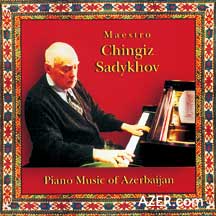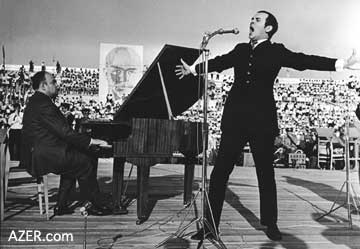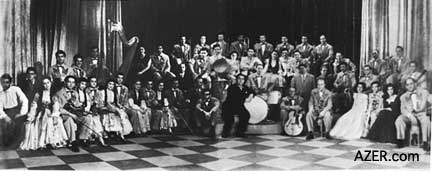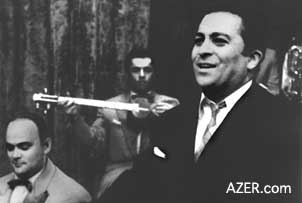|

Autumn 2002 (10.3)
Pages
60-63
The Show Must Go On
Memories
of Accompanying Azerbaijan's Greatest Singers
by Chingiz Sadikhov
Chingiz Sadikhov's latest CD, "Piano
Music of Azerbaijan".
Listen and purchase at AI
Store.
  Renowned pianist Chingiz Sadikhov (1929-
) has spent much of his life accompanying Azerbaijan's most prominent
singers, including Bulbul (1897-1961), the founder of Azerbaijan's
professional vocal school; Rashid Behbudov (1915-1989), the singer
who most often represented Azerbaijan throughout the world during
the Soviet period; and Muslim Magomayev (1942-October 25, 2008),
one of the former Soviet Union's best-known pop stars. When asked
how many songs are in his repertoire, Chingiz readily admits
that there are so many that he wouldn't know where to start counting.
Up until his move to San Francisco in the mid-1990s, he boasts,
there was not a single Azerbaijani song that he didn't know or
couldn't play. Recently, Chingiz spoke with AI about his long
musical career and his philosophy about the art of accompanying. Renowned pianist Chingiz Sadikhov (1929-
) has spent much of his life accompanying Azerbaijan's most prominent
singers, including Bulbul (1897-1961), the founder of Azerbaijan's
professional vocal school; Rashid Behbudov (1915-1989), the singer
who most often represented Azerbaijan throughout the world during
the Soviet period; and Muslim Magomayev (1942-October 25, 2008),
one of the former Soviet Union's best-known pop stars. When asked
how many songs are in his repertoire, Chingiz readily admits
that there are so many that he wouldn't know where to start counting.
Up until his move to San Francisco in the mid-1990s, he boasts,
there was not a single Azerbaijani song that he didn't know or
couldn't play. Recently, Chingiz spoke with AI about his long
musical career and his philosophy about the art of accompanying.
______
I always say that we pianists
have to be prepared for anything. Other musicians get to have
their own instruments - violins, cellos, trumpets, clarinets.
They're familiar with all the nuances of their instruments -
both positive and negative. But we pianists have to make do with
whatever happens to be available. If we get a good piano, we
say "thank you". If we get a bad piano, we say "thank
you" as well. What else can we do? Before each performance,
I make it a point to check out the piano. I want to know how
it's been tuned, if it has any false notes, if all of the keys
work, if the keys are stiff or not. From experience, I've learned
how important it is to be forewarned.
  Piano Hammers Missing Piano Hammers Missing
Left: Performance of Muslim Magomayev accompanied
by Chingiz Sadikhov in the "Holiday of Song" in the
city of Kirovabad (now Ganja) on July 7, 1971.
Once in the early 1960s, I went out to sea to perform at a concert
for the oil workers at Oil Rocks [the world's first deep-sea
oil exploration project, constructed on trestles and piers in
the Caspian in 1948]. Upon arriving by ship, I went over to the
club to check out the piano. They told me: "Oh, we have
such a wonderful piano! It's brand new. We received it just yesterday.
But it's locked and the director has the key. Don't worry, the
piano tuner was just here yesterday to check it out. Everything
is fine."
That evening, the concert emcee announced: "'Azerbaijan
Ellari' (Land of Azerbaijan) by Fikrat Amirov, performed by the
'Honored Artist of the Republic', Sona Aslanova, accompanied
on the grand piano by Chingiz Sadikhov."
Sona and I made our entrance
onstage and took our bows. I sat down at the piano. But when
I started to play the introduction, no sound came out! What could
possibly be wrong? Sona looked at me, I looked at her. I tried
to calm her: "Don't worry, everything will work out."
Again, I tried to play, but again, no sound. I then raised the
piano lid and discovered that all of the piano hammers were missing.
No wonder there was no sound! Later I found out that two of the
hammers had been broken, so the tuner had taken all of them out
to be repaired.
Left: A statue to the memory of Rashid Behbudov
has recently been erected in Baku's Cemetery for the Honored
Ones (Fakhri Khiyaban). Photo by Elman Gurbanov.
Right: Sadikhov (left) accompanying singer
Rashid Behbudov.
In the meantime, what were we to do? I was supposed to provide
the accompaniment for the entire concert. Without me, there would
be no program.
The curtains closed, and the audience started booing and yelling.
We had to come up with a solution right away.
I asked the director: "Do you have an accordion?"
"Yes, a big accordion that we use for concerts. Why?"
"Bring it right away."
When the director came back with the accordion, I had him set
up a table. Then I told him, "Now choose three strong guys
from the audience."
I only knew how to play the right hand on an accordion; I didn't
know much about the buttons on the left hand. So we set the accordion
down on the table and I asked two guys to hold it down on both
sides so that it wouldn't move. The third guy had the tough job
of stretching the bellows in and out while I played on the keyboard,
piano-style, with both hands. And so, the show went on.
Piano Pitched Low
Then there was another time in late 1962 when Rashid Behbudov
was on tour in Iran. As soon as we arrived in Isfahan, I went
to check out the hall where we would perform. It had a beautiful
piano - well tuned, new, easy to play.

Above: The State Variety Ensemble of Azerbaijan
performing with Rashid Behbudov in 1957. Rashid (center). Chingiz
Sadikhov (far right).
An hour before the concert, we began warming up. Rashid went
onstage to make sure everything was in order. He had a pitch
pipe and soon detected that the piano had been tuned a half-step
lower than normal. For instance, the G key played an F# - that
is, the note that was a half-step lower. Can you imagine?
Rashid was puzzled: what could have happened? I told him: "I
checked the piano this morning, but since I didn't have a tuning
fork with me, I couldn't tell that anything was wrong. Besides,
Rashid, if the piano were tuned too high, it would have made
it more difficult for you. It's tuned lower, so that should make
it even easier for you. It's not so disastrous after all."
"But my voice is used to singing exact pitch," Rashid
observed, and then he told me: "Do whatever you want, but
I absolutely must sing in the key that I'm used to."
And so all evening long I had to transpose the songs up a half-step.
Instead of the key I usually played in-A minor-which is very
comfortable for me and doesn't require any black keys, I had
to transpose everything to B - flat minor, which uses almost
all black keys. All of this had to be done instantaneously -
not just for one or two songs, but for all 32 on the program!
We had no chance to rehearse in the new key. What else could
I do? It was extremely difficult. I'm sure I still have a few
gray hairs from that concert.
Early Signs of
Talent
I was born on April 5, 1929. My musical training started at an
early age, when  I was six years old. My family discovered
that I had perfect pitch and could play back melodies that I
heard. For instance, when I heard a melody that I liked, I would
go up to our piano at home and start picking out the tune with
one finger; sometimes, I would even add a little harmony with
my left hand as well. That's when everybody decided that I should
study music. I was six years old. My family discovered
that I had perfect pitch and could play back melodies that I
heard. For instance, when I heard a melody that I liked, I would
go up to our piano at home and start picking out the tune with
one finger; sometimes, I would even add a little harmony with
my left hand as well. That's when everybody decided that I should
study music.
My parents were not musicians, although my birth mother used
to sing mugham [traditional modal music]. People tell me that
she had a very sweet, pleasant voice and could sing very well.
As she died when I was only three years old, I don't remember.
But, perhaps, I inherited some of her musical ability.
When I was 10 years old, in
1939, Uzeyir Hajibeyov organized a special children's music school
at the Conservatory, which was called the School for Gifted Children.
Hajibeyov was such a great, great person. I remember how he would
talk one-on-one with every child who was selected for that school.
When my turn came, he called me into the room, gave me a hug
and asked me to play a musical piece.
And so I attended the School for Gifted Children from 1939 to
1946. Since the school was located within Baku's Music Conservatory
itself, upon graduation from the 10th grade, students automatically
entered the first year at the Conservatory. No entrance exams
were required of them.
In 1951, I graduated from the Conservatory, then headed to Moscow
for postgraduate studies at the Conservatory there. I succeeded
in taking classes from Professor Alexander Goldenveizer, who
at that time was heading up the State Commission for graduation
exams.
Throughout those years, I studied to be a classical pianist.
But when I returned to Baku in 1953, one of those chances that
come along "once-in-a-lifetime". It completely changed
the direction of my life. It just so happened that Professor
Bulbul was preparing for a tour of Central Asia. Something had
happened to his accompanist, I don't remember exactly what. Bulbul
asked me: "Chingiz, why don't you come with me? I'll be
singing Azeri folk songs. You know all of them, so you can accompany
me."
So we went to Central Asia. Once I started accompanying Bulbul,
I realized that my calling was not as a solo pianist, but as
an accompanist.
Role of the Accompanist
During that tour, I soon learned that accompanists must have
the ability to adapt immediately to any situation. At one of
our concerts, after Bulbul had sung his entire program, the audience
wouldn't let him go. He sang six more songs that we had never
rehearsed before. Such things can happen.
Onstage, the accompanist is responsible not only for himself,
but for the soloist as well. He has to be reliable and allow
the vocalist to express his own emotions and technique without
worrying about the accompanist.
An accompanist has to be able to sense if the soloist is having
a good day or a bad day, if he's performing well, or if he has
the slightest hint of a cold. And he'll need support, too, if
he suddenly draws a blank with the lyrics.
Most accompanists just play the harmony, but sometimes the singer
needs more support than that-for example, to help him achieve
high notes, or to help him through certain phrases so that he
can sing easily.
I was the first one in Azerbaijan to emphasize that an accompanist
must play without looking at the musical score. Why? Well, if
he has to look at the music or his fingers, then he can't concentrate
all of his attention on the vocalist. An accompanist should memorize
all of the pieces - that way, he can concentrate on the vocalist
and sense his every move. If the singer is running out of breath,
then the accompanist can support him with more harmony. Maybe
the singer wants to stretch out a note or a phrase for dramatic
effect. An accompanist needs to be sensitive to these issues
and always be ready to adjust instantly as required.
Rashid Behbudov
I worked with Rashid Behbudov for seven years, from 1956 until
1964. When Rashid organized the State Stage Orchestra of Azerbaijan,
I became its concertmaster and accompanist. He and I worked with
that orchestra until 1958. Then Rashid decided that he didn't
need the orchestra, so we began working without it, just the
two of us.
Our first trip abroad was to Syria, then Iraq, then again to
Syria, Egypt, Turkey and so on. There were a lot of trips outside
of the USSR. In 1960, Rashid and I went to India. I remember
that he sang an Indian song there. [During the interview, Chingiz
started humming the melody to this Indian song that they had
performed together 42 years earlier]. Rashid loved to learn some
of the popular songs in the native languages of the countries
he was performing in. That always made a deep impact and endeared
him to his audience.
I learned a great deal from Rashid. I learned to really feel
a vocalist. I remember how Rashid would stand next to the piano,
facing the audience. I could only see the right side of his face,
but I knew from his right cheek what he was going to do next:
whether he would stop, whether he would stretch a note - I could
read it all from his right cheek. The contact between us was
that deep.
With Rashid, everything was thoroughly rehearsed beforehand.
He had certain patterns about how he would come onstage, how
I would come onstage, how we would bow, how I would take my seat,
and so on. He would stand with his arm outstretched on the piano;
then, once he was ready, he would raise his little finger, and
I would start to play. His most popular songs were basically
folk songs, such as "Gulabatin" (Golden Thread), "Aghajda
Alma" (Apple on the Tree) and "Uja Dagh Bashinda"
(On Top of the High Mountain).
From November 1962 until February 1963, Rashid and I toured Iran
- 80 days altogether. We visited four cities: Tehran, Isfahan,
Shiraz and Abadan. But no matter how much Rashid asked, we weren't
allowed to go to any of the cities in the Southern Azerbaijani
provinces, such as Tabriz, Ardabil or Urmia.
Almost all of our concerts were packed. But I'll never forget
once, in Tehran, about 10 minutes before the concert was to begin,
I looked out from behind the curtain and noticed that there were
only about 100 people in the entire hall, which had the capacity
of seating about 900. "What's the matter?" I wondered.
"Are the people tired of us already?"
I asked the theater manager what was wrong. "I don't know,"
he told me. "But all of the tickets are sold out. There's
not a single one left."
We told Rashid about it. "Well, if all of the tickets are
sold out, then we'll have to do our work." So we did the
entire concert for only 100 people. Many of the women in the
audience were crying during that performance. When I see a woman
cry, to me it means that she is experiencing very deep emotions.
It's a good thing; it means that the music is bringing out very
deep feelings.
After the concert, when we were backstage, we heard a knock on
the door. Two older men entered. "Thank you very much,"
they said to us. "That was a superb concert. We enjoyed
it a lot. We are Azerbaijanis from Tabriz. Our two families decided
to buy all of the tickets to your concert so that nobody else
would be in the hall."
Can you imagine? There were two families: grandfathers, grandmothers,
sons, daughters, grandchildren, great-grandchildren - 50 people
from one family and 50 from another family. They had traveled
the 300 miles to Tehran specifically to attend Rashid's concert
and bought all of the tickets! Since we weren't allowed to tour
in the Azerbaijani cities in Iran, they had come to us.
Muslim Magomayev
After working with Rashid, I worked at the Philharmonic for one
year as a soloist and accompanist. Then in 1964, I began working
with singer Muslim Magomayev. Again, it was seven years that
we performed together, until 1971. We toured all over the Soviet
Union and visited several other countries, including Hungary
and Canada.
Muslim was extremely emotional and spontaneous - in fact, quite
different from Rashid. For instance, one day Muslim would start
the concert early; the next day, he would be late. Depending
on his mood, he would sing one song one day, and the next day
- another. He just went onstage and sang, thoroughly immersed
in what he did. In this respect, Rashid and Muslim were quite
different from each other.
Muslim is very talented. His voice has a unique timbre and a
wide diapason, which allows him to sing many types of songs:
opera arias, Neapolitan songs as well as folk songs. When we
toured together, he would mesmerize his audience. His popularity
had no limits.
I remember once Muslim and I were performing at the "Decade
of Azerbaijani Culture and Art" in Moldavia. After the concert,
we returned to our hotel. It was already 10:30 at night, and
we were staying on the fourth floor.
Suddenly, I heard voices outside chanting, "Ma-go-MA-yev!
Ma-go-MA-yev"! I went out onto the balcony and saw at least
a thousand people gathered in front of the hotel. When Muslim
appeared on the balcony, they said: "Muslim, we couldn't
get to your concert. Please sing to us now!" Can you imagine?
Singing from the balcony of the fourth floor, without any accompaniment?
Muslim said to me: "China [pronounced CHEE-nah, an endearing
abbreviation of Chingiz], what should we do? Go get the accordion
from the orchestra downstairs." I went downstairs, got the
accordion and returned to the suite. That night, Muslim sang
about a dozen songs to the crowd, with me accompanying him on
the balcony on the accordion.
Experience Abroad
During my lifetime, I've traveled to dozens of countries-India,
Vietnam, Afghanistan, Pakistan, Turkey, Iran, Syria, Iraq, Egypt,
Libya, Lebanon, Poland, Bulgaria, Hungary, Romania, Yugoslavia,
Czechoslovakia, Germany, England, Finland, Canada and the United
States. That's pretty much it.
In 1971 I was appointed Director of Baku's Music School No. 16,
where I stayed until 1981. During my tenure, the USSR Ministry
of Culture sent me to Adan, Yemen for three years (1973-1976).
While I was there, I taught 40 students everything that was being
taught in seven-year music schools of the USSR. After graduation,
they became teachers at music schools in Yemen.
Six years later, the Prime Minister of Yemen, Ali Naser Muhammad,
personally invited me back to serve as an advisor to Yemen's
Minister of Culture. I worked there for three years (1983-1986),
helping to arrange all of the cultural events in the country:
concerts, festivals, visiting artists. I brought in exchange
students from Azerbaijan who were studying Arabic; we also sent
Yemen students to study at the universities and institutes of
the Soviet Union.
At that time, I was on leave from my job as Artistic Manager
of AzConcert, a post I held throughout the 1980s. At AzConcert,
I was responsible for managing all of the concerts held in the
Republic, including the concerts of local and visiting artists,
singers, musicians and dancers. I also worked as a Professor
at the Baku Conservatory, in the accompaniment department.
Move to the United
States
In 1991, my wife, Jeyran, and I visited the United States at
the invitation of our American friends Mabel and Roger Owen,
who were members of the American-Soviet Friendship Society. During
that visit, I gave a charity concert in Berkeley, California
to raise money for the children from Chernobyl who had been brought
to San Francisco for treatment. Mabel and Roger asked me to include
some Azerbaijani pieces into my program, which I gladly did.
I never imagined that the Azeri music would produce such an emotional
effect on the audience. You could see tears welling in people's
eyes.
After the concert, everybody thanked me for introducing such
beautiful music to them. They asked a lot of questions about
Azerbaijan and its people. At that time, the war was going on
in Nagorno-Karabakh. Few people knew the truth about the situation
in the region; for instance, they didn't realize that Karabakh
doesn't even border Armenia. That was when I got the idea to
familiarize the American audience with the beauty of Azeri music.
Soon after I returned to Baku, however, I broke my leg and couldn't
travel. Finally, in 1994, I moved to the United States. Those
first few years were very difficult. Just imagine what it was
like for me. I was used to all kinds of privileges back in my
homeland. I was a well-known figure among my people. Then suddenly
I came to this country where nobody knew me and nobody needed
me. That was such a difficult period for me. Remember, I was
about 65 years old at the time, not a 20-year-old lad.
But gradually, I'm finding my way. I've performed Azeri music
in more than 30 cities of the United States and Canada. I'm proud
to say that often there have been many questions and discussions
after the concerts, as listeners are always keen to learn more
about Azerbaijan.
I consider myself privileged to be able to do that at my age
for my people and for my country. I'm 73 years old now. My country
has awarded me with the most coveted titles possible - Honored
Artist of Azerbaijan (1959), People's Artist of Azerbaijan (1987)
and Professor of Music. In 2001, the Azerbaijan Cultural Society
in Northern California awarded me with a plaque in recognition
and appreciation of my service to Azerbaijani music.
I have two daughters who are very good professional musicians
and teachers - Nargiz (piano) and Lala (violin). When they perform,
they always include pieces by Azerbaijani composers in their
programs. Recently, Nargiz and I played "Aziz Surat"
(Dear Image) by Tofig Guliyev on two pianos at a concert. I'm
sure my daughters will follow in my footsteps enjoying and promoting
Azerbaijani music.
Chingiz Sadikhov [also spelled
Sadykhov or Sadighov] lives in San Francisco. He was interviewed
in Los Angeles in August 2002 by AI Editor Betty Blair with Arzu
Aghayeva and Narges Abadi. He may be reached at ig@hayat.us.
Chingiz has just released a new CD, "Piano
Music of Azerbaijan," which features Azerbaijani folk
songs and love songs. It is available at the AI
STORE at AZER.com. The CD
was engineered and produced by Kutay Derin Kugay of 7/8 Music
Productions. To listen to sound samples or purchase, click on
"Music".
____
Back to Index
AI 10.3 (Autumn 2002)
AI Home
| Search | Magazine
Choice
| Topics
| AI Store | Contact us
Other Web sites
created by Azerbaijan International
AZgallery.org | AZERI.org | HAJIBEYOV.com
|





